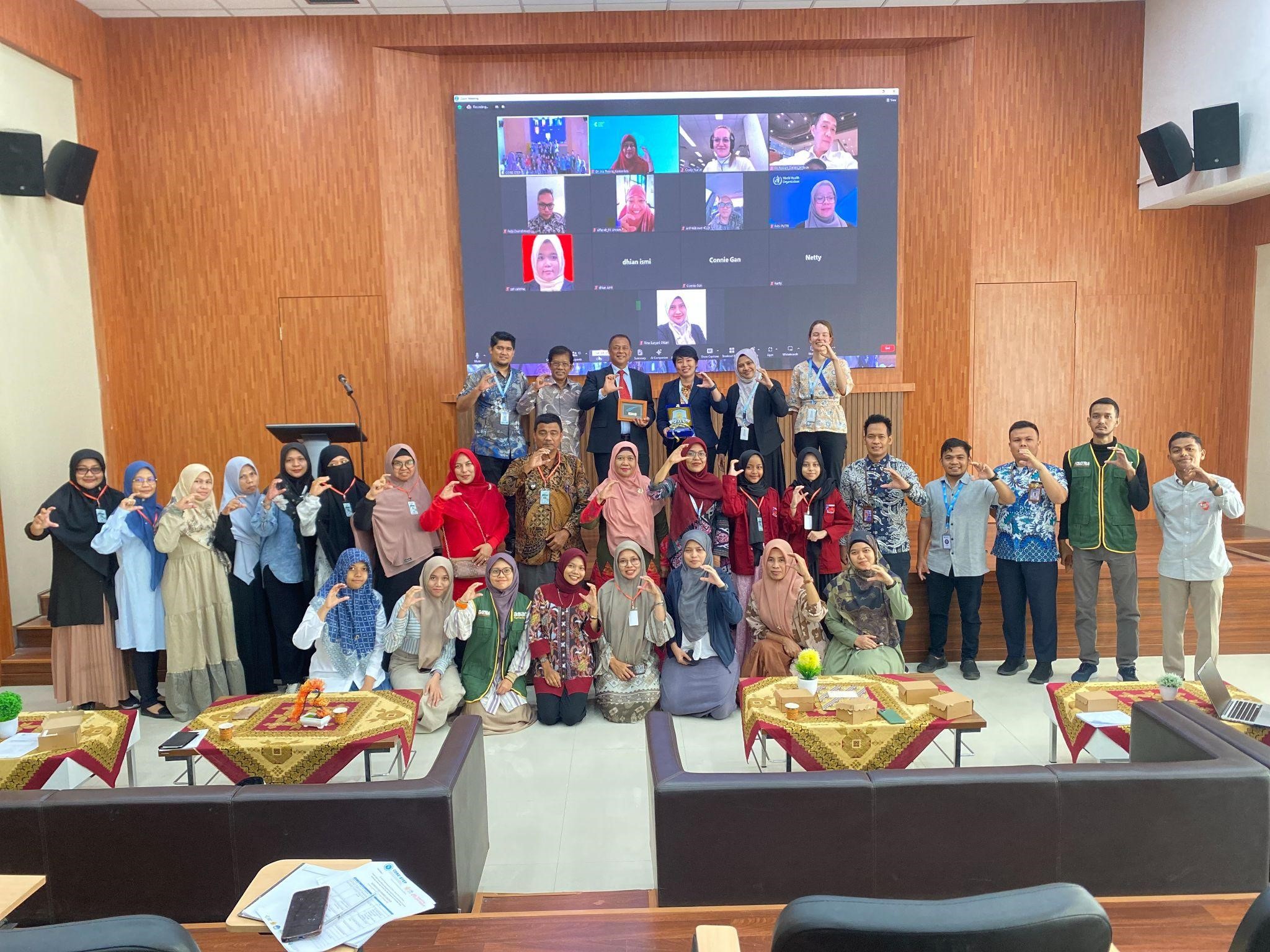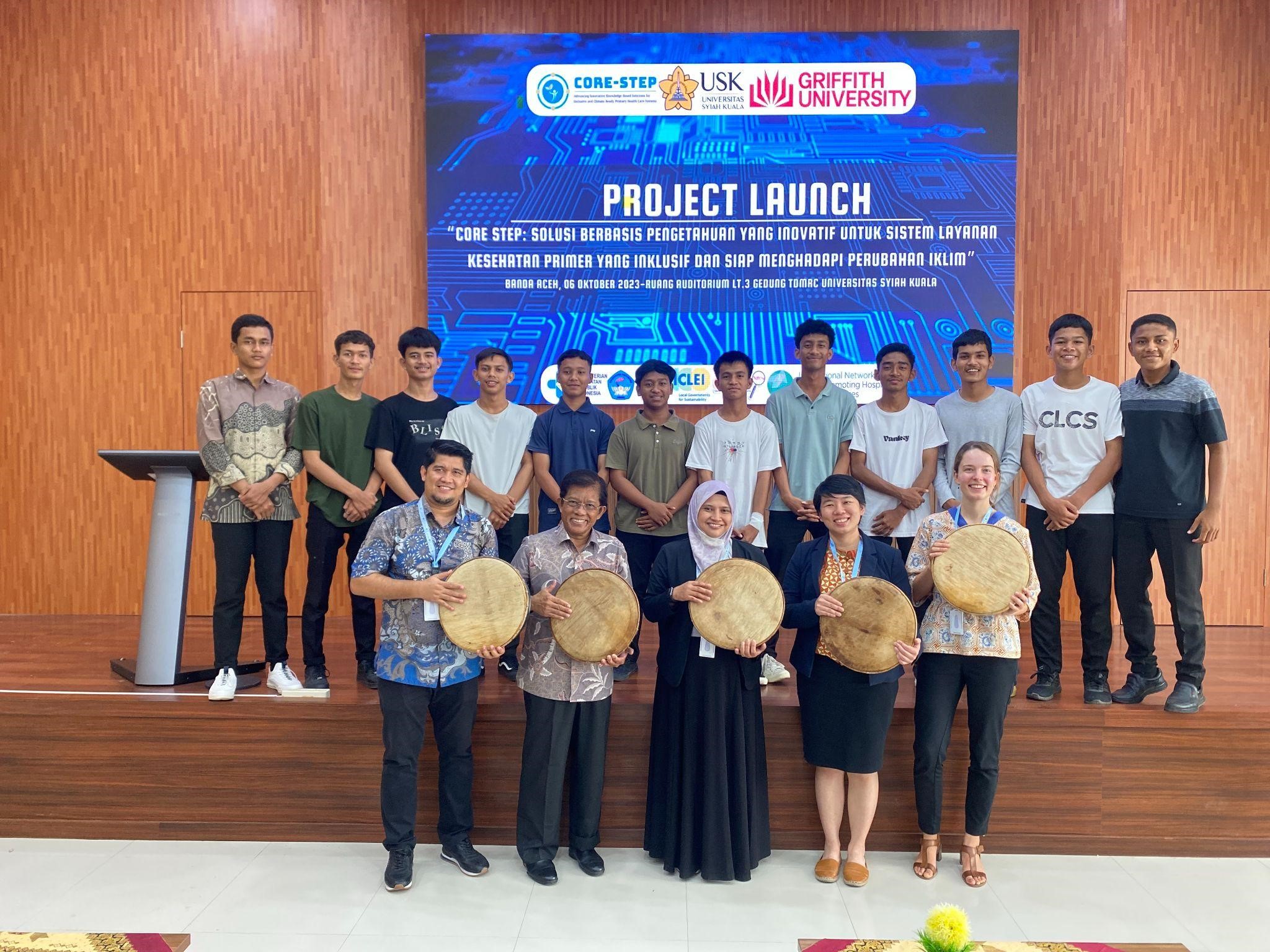
Photo Group Session FGD Core-Step Banda Aceh
Banda Aceh – After launching and carrying out initial data collection in Ambon City on September 25, 2023 and Mataram City on October 02, 2023, the Project funded by the Australian Government through Connection Grants entitled “CORE-STEP: Innovative Knowledge-Based Solutions for an Inclusive and Climate Change Ready Primary Health Care System” then continued in Banda Aceh City which began with Project Launch activities held at the TDMRC Auditorium Room on on October 6, 2023, from 08.30 to 11.30 and followed by FGD at 13.30 at Kyriad Muraya Hotel Banda Aceh.
The Project Launch activity in Banda Aceh invited participants from various circles including several researchers from TDMRC USK. This activity was also attended by stakeholders such as the Banda Aceh City Health Office, BPBD Banda Aceh City, BPJS, BMKG, BPS and various NGOs in Banda Aceh as well as Puskesmas who were selected to be pilots for the Banda Aceh region in this project, namely Lampulo Health Center and Batoh Health Center.
The launching of the “Core Step” project which is a collaboration of Universitas Syiah Kuala (USK), Griffith University, Mataram University, Pattimura University, Ambon, Ministry of Health, ICLEI Indonesia, CARI!, International Network of Health Promoting Hospitals &; Health Services was opened with a project overview by Dr. Rina Suryani Oktari, S. Kep., M. Si (USK) as Project Indonesia Coordinator and also TDMRC disaster education cluster coordinator and Dr. Connie Cai Ru Gan as Project Australia Coordinator. In her explanation, Dr. Rina Suryani Oktari said that this project has 2 main objectives, namely assessing how the vulnerability, capacity, and needs of PUSKESMAS in dealing with the impacts of climate change, and developing a dashboard that is expected to help PUSKESMAS in making the decisions needed. On this occasion, Dr. Rina Suryani Oktari also expressed her gratitude to all parties who have helped and are willing to collaborate in this research project.”
Furthermore, Dr.Connie (Griffith University) who was present directly in Banda Aceh in her speech expressed her admiration for all the extraordinary input and involvement in each location that has been visited for this Core-Step research. Dr. Connie also thanked the coordinators at each location who have facilitated the research team to be able to connect and work with the local health office. In addition, Dr. Connie gave appreciation to university students who helped with various series of activities that have been carried out. “The FGD and visit to PUSKESMAS provided great insight into how PUSKESMAS are dealing with the impacts of climate change and the kind of data they collect and use to provide the best health services for their communities,” continued Dr. Connie.
The representative of research advisor from Australia (Griffith University), Prof. Sara Davies, also gave a speech. “In the last two weeks, the team has conducted focus group discussions that are very interactive and involve stakeholders who are enthusiastic about sharing knowledge and experience, precisely in Ambon and Mataram, and will then be carried out in Banda Aceh. This team has collected information related to the initial challenges faced by Puskesmas in turning data into useful information to support the planning and implementation of health programs. For example, reporting of climate-sensitive diseases is carried out individually through various systems and applications at PUSKESMAS, as well as at the provincial and city levels. This illustrates the significant potential of this pilot project to develop into a valuable decision-making tool that can help meet context-specific needs.”
In addition, Research Advisor from USK, Dr. dr. M. Yani, M.Kes, PKK in his short speech invited the involvement of parties in collecting data on this research, one of which is in the FGD activity which will be held this afternoon. “We know that this research was conducted in 3 cities in Indonesia which are both cities in coastal areas, namely, Ambon, Mataram and Banda Aceh. But these three cities have uniqueness, customs, and differences, it is hoped that from these differences we can conclude the right solution for climate resilience in Indonesia. We can also share with friends in Australia related to resilience improvement strategies, it is hoped that this research will not only be useful for Indonesia but also for the world, “he explained further.

The opening ceremony was opened with the beating of Rebana
The representative of the Faculty of Medicine and Dentistry, Griffith University, Professor Bernadette Sebar also gave an online speech, she stated that this collaboration was made possible thanks to Dr.Connie and Dr.Okta, she also expressed appreciation to the funding party, namely Australia’s flagship program, CONNECTION. He stressed the importance of collaboration between Griffith University and USK in achieving health equity in crisis situations.
The Project Launch activity was also attended by representatives of the Ministry of Health, Indonesia (Centre for Health Crisis) and WHO. The representative of the ministry of health was dr. Ira Cyndira Tresna M.I.Kom who read a speech from the head of the crisis center, namely Dr. Sumarjaya, SKM, MM, MFP, C.F.A. “Climate change adaptation to climate-sensitive diseases needs to prioritize preventive health interventions that are carried out in a transformative and long-term manner focused on priority locations before there is a surge in events. Puskesmas being the spearhead in the public health system, puskesmas must have basic capacity. Increasing the capacity of primary health systems absolutely requires transformation involving stakeholders and various parties. In addition, the use of technology is also an important point for data integration that can be utilized. The involvement of academics and others in strengthening primary health care centers, especially in facing and responding to future climate change challenges, is very important with the current disparity in resources, quality and essential health outcomes.” Meanwhile, representatives of NPO Health Emergencies WHO Indonesia in his speech affirmed their support and are ready to be further involved in this activity.
The Project Launching was inaugurated by Vice Rector I of USK, Prof. Agus Sabti, in his speech he stated that “climate change has a negative impact on society, through this project we are looking for solutions by looking for the cause of the problem, so we can find from the cause to what kind of consequences, in this case related to climate change, environmental damage. This project is certainly multidisciplinary in nature, this collaboration will produce great benefits, especially in dealing with the adverse effects of climate change.”
Site coordinator for Banda Aceh, dr. Hendra Kurniawan, when interviewed separately, stated that “The Banda Aceh Launching Project is the culmination of a series of launching activities that we have previously successfully carried out in Mataram and Ambon. This project launch invites parties to share with the aim of introducing the Core Step project that we will do over the next year, and to invite various parties to get involved in supporting this research in the future.”
The Project Launch activity was also enlivened by rapai performances from Darul Ulum studio, and closed with the handover of souvenirs from Griffith University to USK and vice versa. Griffith University explained that the souvenirs given were leaves from eucalyptus trees which are the main food source for koalas. The painting was hand-painted by Aboriginal people to acknowledge the relationship between people, animals and the environment. The contribution of local knowledge and culture is embraced in research and teaching.


